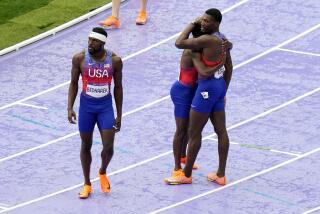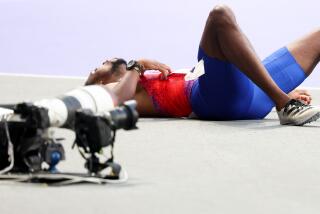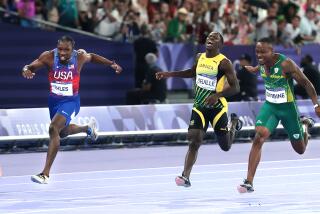It’s Ryan Lochte’s time in 400 IM
- Share via
LONDON — — He has posed, shirtless, for the cover of Vogue. He has worn high-top shoes with wings, decorated in red, white and blue. He has sold lime-green novelty glasses with his pet phrase — JEAH! — shading the eyes.
His marketing team has advertised him as the next big thing in American swimming, the fun-loving successor to the decorated but dour Michael Phelps.
An image is one thing. A champion is quite another.
Ryan Lochte walked the walk Saturday, blowing away Phelps and flirting with a world record in winning the 400-meter individual medley, the first and possibly most grueling swimming event of the Olympics.
Lochte called it, as he reminded everyone after the race.
“I’ve said this before: This is my year,” he said after winning in 4 minutes 5.18 seconds. “I know. I feel it. I’ve trained my butt off for four years.
“I feel it in my gut. This is my year, and there is no better way to start these Olympics.”
For the first time in 12 years, Phelps failed to win a medal in an Olympic race. In 2008, he won a record eight gold medals — in eight tries. In 2004, he won six golds and two bronzes.
This time, after swimming so poorly in qualifying that he had to salvage the last available spot in the finals, Phelps faded badly in the final and finished fourth, more than four seconds behind Lochte.
“Just a crappy race,” said Phelps, who later called the result “pretty upsetting.”
Lochte beat Phelps in the event in the Olympic trials, but by less than one second. No one else was within three seconds of Lochte.
Lochte improved his trials time by almost two seconds. Phelps would have won silver if he had simply duplicated his trials time. Most swimmers deliver faster times in the Olympics than in the trials; Phelps was a second and a half slower.
“I’m surprised,” said Bob Bowman, Phelps’ coach. “Not pleasantly.”
Phelps had vowed never to swim the 400 IM after setting the world record in Beijing, a vow to which he might wish he had stayed true. He essentially took two years off after the 2008 Games, and the stamina that he appeared to have regained by last month’s trials turned out to be fleeting.
“It’s ultimately a fitness issue,” Bowman said, “what he did over the last four years.”
Lochte made a similar point, and in so doing took an apparent shot at the Phelps mythology of the unbeatable man of Beijing. Lochte lost to Phelps in the 200 and 400 IM in the 2008 Games, and since then he has dragged tires in training and excised junk food from his diet.
“If I had known that years ago, Beijing would have been a different scenario,” Lochte said.
Lochte won America’s lone gold on the first day of swimming competition. Elizabeth Beisel won silver in the women’s 400 IM, with Shiwen Ye of China winning gold and setting a world record. Peter Vanderkaay won bronze in the men’s 400 freestyle, behind Yang Sun of China and Taehwan Park of South Korea.
The U.S. women won bronze in the 400-meter freestyle relay, with Australia first and the Netherlands second.
Natalie Coughlin won her 12th career medal, tying the U.S. women’s swimming record shared by Jenny Thompson and Dara Torres. Coughlin, in her only event in these Olympics, swam in the qualifying heats of the relay but was not selected for the final by U.S. women’s Coach Teri McKeever.
Dana Vollmer set Olympic and U.S. records in a qualifying heat for the women’s 100 butterfly, putting her in position to challenge the world record in Sunday’s final.
Lochte scoffed at the notion that the Phelps flop Saturday foretold an ugly week for the legendary champion. Phelps, who has said he is retiring after these Games, needs three medals in his remaining six events to set an Olympic record for total medals in any sport.
“I’ll tell you this,” Lochte said. “The next race he is in, he is going to light it up.”
On this night, however, it was Lochte lighting up the Aquatics Centre — with his lemon-lime victory sneakers, his initials in sign language on his swim cap and his cellphone ringing noisily to interrupt his news conference.
And he was so dominant in victory that he was pleased to offer one reason why he fell off the world-record pace in the final 100 meters of his race.
“I kept on looking at the scoreboard,” he said. “I guess that slowed me down.”
twitter.com/BillShaikin
More to Read
Go beyond the scoreboard
Get the latest on L.A.'s teams in the daily Sports Report newsletter.
You may occasionally receive promotional content from the Los Angeles Times.







